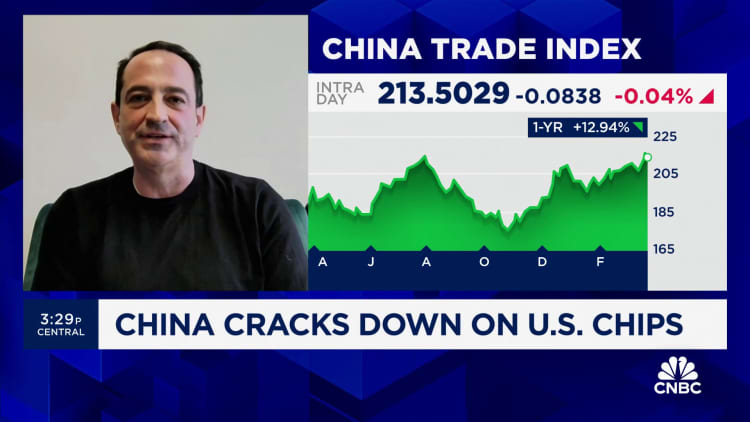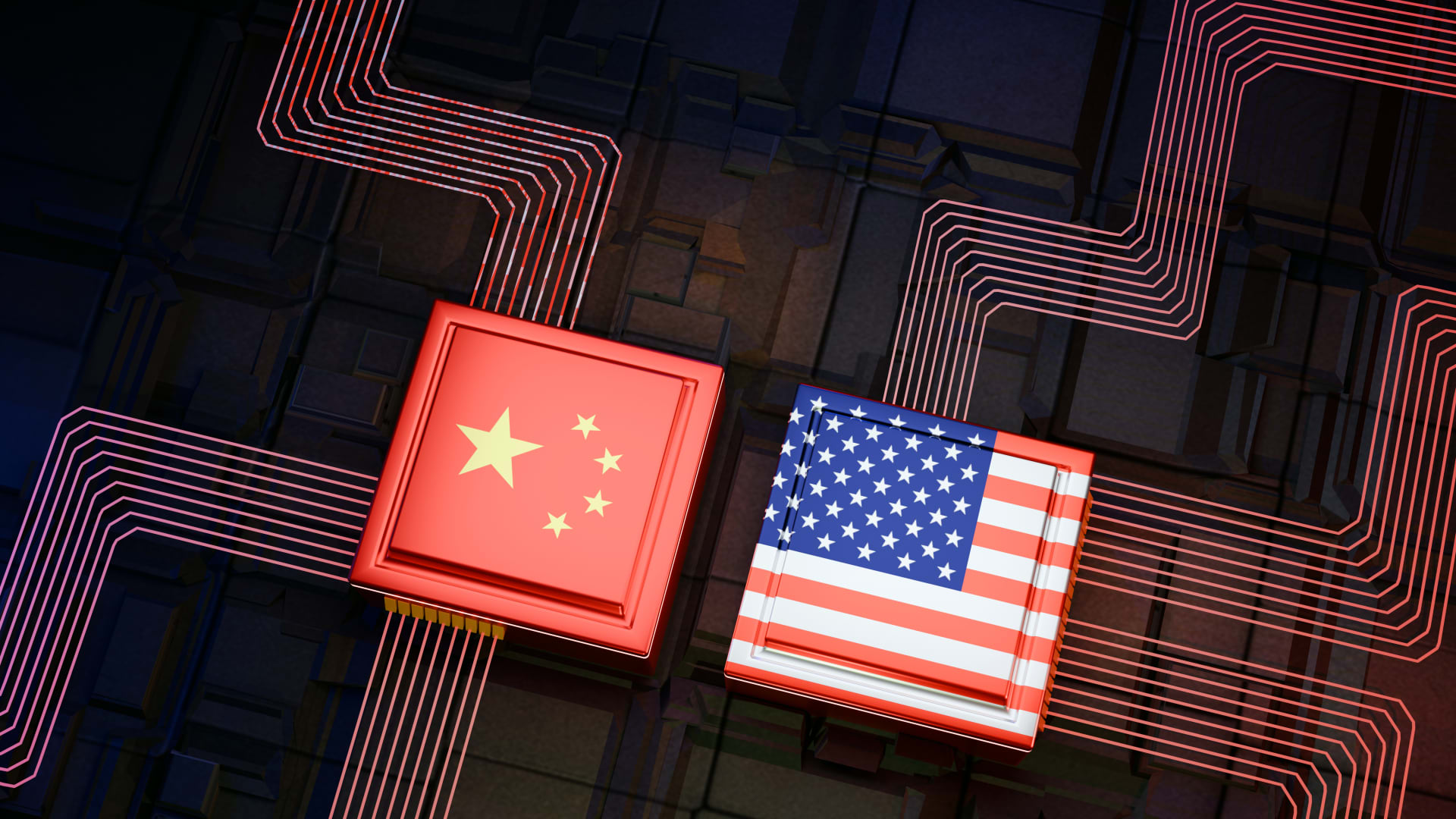US-China chip war graphic
Wong Yu Liang | Moment | Getty Images
China remains an essential market for most American chipmakers despite Washington’s efforts to restrict chip sales to the country and amid Beijing’s push for self sufficiency in the semiconductor sector.
Data from S&P Global showed that U.S. chip giants Intel, Broadcom, Qualcomm and Marvell Technology all generate more revenue from China compared with the U.S.
The U.S. has passed a series of export controls starting in October 2022 aimed at restricting China’s access to advanced chip technology, particularly those used in AI applications.
“China remains an important market for U.S. chipmakers, and the U.S. restrictions on selling advanced AI chips to China have been designed specifically to allow most U.S. firms to continue selling most types of chips to Chinese customers,” Chris Miller, author of “Chip War,” told CNBC.
Used in a wide range of products, from smartphones to electric vehicles, semiconductors have become a top priority for governments globally.
According to data from tech consultancy Omdia, China consumes nearly 50% of the world’s semiconductors as it is the biggest market for assembling consumer devices.
U.S. chipmakers, which enjoy technological leadership over Chinese competitors, have been able to tap this demand as the U.S. export curbs are focused on some very specific products.
“There are still plenty of ‘high end’ chips with all types of allowable use cases that are good to go where U.S. based chip companies have the dominant, leading edge,” said William B. Bailey, lead technology, media, and telecommunications analyst at Nasdaq IR Intelligence.
Navigating export curbs
U.S. chipmakers, even those with a majority of business in the U.S., such as Micron Technology, AMD, and Nvidia, have strived to serve their Chinese clients even in the face of export controls.
When the first wave of U.S. restrictions came into effect late in 2022, Nvidia and Intel designed modified versions of AI chip products for the Chinese market.
A year later, the U.S. updated the export rules to tackle these perceived loopholes. But, soon after, it was reported that Nvidia was working on a new chip made for China.
Intel has reportedly continued to sell hundreds of millions of dollars worth of laptop processor chips to U.S.-sanctioned Chinese telecoms company Huawei, thanks to an export license issued by the Donald Trump administration.
The company did not respond to a request for comment on their plans for the China market.
AMD has also designed an AI chip for China but will need to apply for an export license after failing to get it past U.S. regulators last month.
Executives of Intel, Qualcomm, and Nvidia, had reportedly been part of a group that planned to lobby Washington against tighter chip restrictions in July last year.
The companies are also members of Semiconductor Industry Association, a major U.S. semiconductor trade organization, which released a statement around the same time requesting an easing of tensions and a halt on further sanctions due to the importance of the Chinese market for domestic chip companies.
Amid a tough policy stance by the U.S., China has also responded in kind. In May last year, chips produced by America’s Micron were banned from critical information infrastructure in China after failing a review by the country’s Cyberspace Administration.
Micron is constructing a new assembly and test manufacturing facility at an existing site in Xi’an, China, as the country “remains an important market for Micron and the semiconductor industry,” a company spokesperson told CNBC. Production is estimated to start in the second half of 2025, they said.
Market share worries
China has been striving for self-reliance by building its domestic semiconductor industry in response to countries such as the U.S. and the Netherlands limiting its access to advanced technology.
Beijing has doled out billions of yuan in subsidies to its chip firms in a bid to boost domestic manufacturing.
An analysis of Huawei’s Mate 60 Pro smartphone by TechInsights revealed an advanced chip made by China’s top chip maker, SMIC. The smartphone is also said to be equipped with 5G connectivity – U.S. sanctions aimed to block Huawei from accessing this technology.

The Chinese government is “increasingly focused” on getting its firms to buy locally made chips, Miller said. “Unless foreign companies have a substantial technological advantage over domestic Chinese competitors, they will lose market share in China.”
However, Phelix Lee, equity analyst at Morningstar, said it does not expect “an overhaul of the supply chain” even as Chinese firms could be innovating legacy chips found in everything from household appliances to medical equipment.
Legacy chips are typically mature or lower-end semiconductors. U.S. Commerce Secretary Gina Raimondo said about 60% of these chips are manufactured by China.
According to Brady Wang, associate director at Counterpoint Research, in the AI GPU market segment, American companies such as Nvidia and Intel are estimated to have a technological lead of about three to five years over Chinese competitors.
“We believe China can still build up its local GPU supply chain for specific market segments, but the amount will be limited, and the cost will be much higher,” he added.

